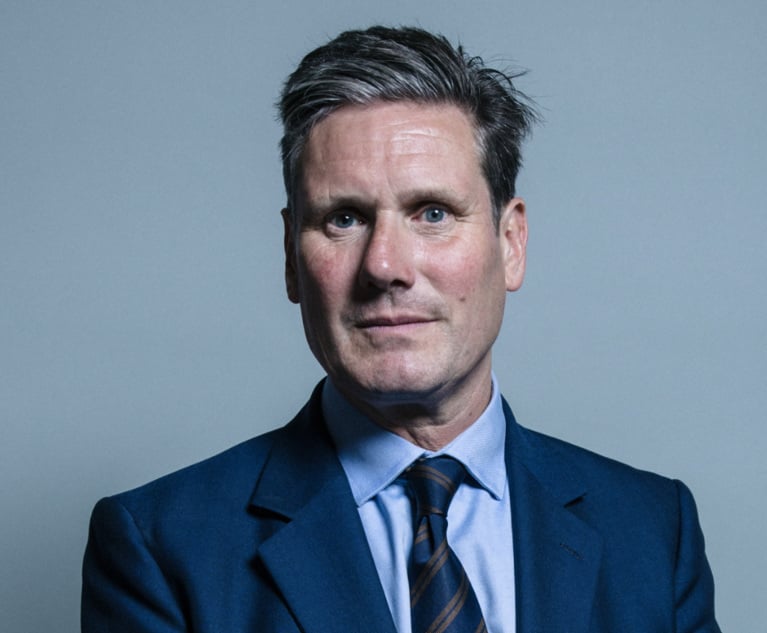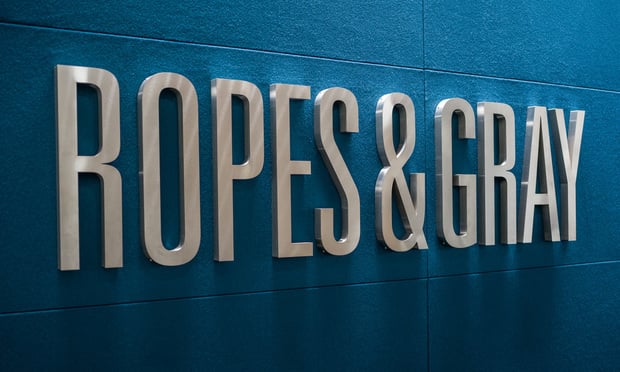'If you're going to play in London, you've got to completely do it or not at all' – what do more Ropes exits mean for the firm's UK plans?
With another four partners set to leave the US firm's City base, Ropes' London ambitions have been called into question
September 13, 2018 at 11:45 AM
5 minute read
A strategic rethink at Ropes & Gray's London office has set the scene for the departure of four more partners, on the back of the droves to have left the firm during the past two years.
But after the firm last year dismissed a spate of London exits as "short-term fluctuations", questions are now being asked about why yet more partner departures are necessary.
The four latest partners set to leave are all from the US firm's real estate and restructuring-related teams in London but, speaking to Legal Week, Ropes' management team insists that while the firm remains committed to both practices, the departures are no reflection on the lawyers themselves.
They argue that the exits comes as the firm moves to more closely align its real estate practice with its core client base of asset managers, private equity houses, hedge funds, credit funds and direct investors, while its restructuring efforts will also be redirected to target key clients.
London managing partner Mike Goetz says: "They are the natural clients for the firm – we found our message here wasn't crisp enough."
Multiple sources suggest that excessive growth in the firm's London office, including expansion beyond Ropes' core areas of private equity and asset management, has been one of the main drivers behind the stream of recent departures.
One ex-partner says: "It grew far too quickly and had no real strategy on the special situations side. It never really got off the ground. They weren't ever big enough. Reading between the lines, they're starting to strip back the office and start again."
Ropes' London lawyer count fell by 18% from 129 to 106 during 2017 and, since the departure of office co-founder Maurice Allen to DLA last February, 10 partners have left the office, even before the four who have now been asked to go.
It's like if you have a wedding coming up – you make sure you can make the dress size you need
As well as Allen, another key loss cited by multiple ex-partners is restructuring partner James Douglas, who moved to Linklaters last summer, while the departure of disputes partner Thomas Ross to Watson Farley & Williams late last year left the firm without any commercial litigation partners in London.
Ropes says it is planning to make lateral hires to rebuild its London offering in practices such as litigation and enforcement, citing this January's hire of Clifford Chance white-collar crime partner Judith Seddon as illustration of its commitment to these areas, but multiple sources suggest that, to date, the lack of a clear London strategy has made it difficult for the City base to make its mark within the wider firm.
One ex-partner comments: "I think the issue is that a lot of the laterals who were hired met with a lot of power struggles – the consequence of that is lots of people leaving."
"If they went after private equity and distressed funds, that's a lot more globally focused, which is what other US firms are doing," adds another partner at a rival firm. "If you're going to play in the London market, you've got to completely do it or not at all. It requires profits from the US partnership, which you've got to be prepared to invest."
There is also some speculation within the market as to whether this "cleaning up" of partners could be a "precursor" to a potential merger, with a globally focused City firm cited as a likely partner.
A partner at a rival firm commented: "The firms that have done well in London have merged or have large teams… If you have a strategic objective of achieving a merger, you will look at practice areas and partners and see if it would fit a merged firm.
"It's like if you have a wedding coming up – you make sure you can make the dress size you need. You trim yourself down a bit."
Sources within the firm, however, dismissed the suggestion that a merger was under consideration.
The final word on the latest departures from Ropes is an appeal for understanding from its remaining London bloc.
"As you would expect in any well-run law firm, we conduct regular reviews of all parts of our business to ensure our strategy is consistent with the needs of our clients and the overall strategy of the firm," says Goetz.
But whether these changes will mean an end to the steady stream of partner exits seen in the past 18 months remains uncertain, as one former partner claims: "I don't know if management even know."
Ropes & Gray London partner departures since April 2017
2018
September – Four partners from real estate and restructuring set to leave
July – Finance partner Benoit Lavigne to Morrison & Foerster
January – Finance partner Matthew Cox to Baker McKenzie
2017
October – Funds partner Michelle Moran to K&L Gates
September – Investment funds partner Monica Gogna to Dechert
August – Government enforcement partner Marcus Thompson and investment funds partner Anand Damodaran to Kirkland & Ellis
June – Finance partners Mark Wesseldine and Fergus Wheeler to King & Spalding
May – Restructuring partner James Douglas to Linklaters
April – Structured finance partner Chris McGarry to White & Case
This content has been archived. It is available through our partners, LexisNexis® and Bloomberg Law.
To view this content, please continue to their sites.
Not a Lexis Subscriber?
Subscribe Now
Not a Bloomberg Law Subscriber?
Subscribe Now
NOT FOR REPRINT
© 2025 ALM Global, LLC, All Rights Reserved. Request academic re-use from www.copyright.com. All other uses, submit a request to [email protected]. For more information visit Asset & Logo Licensing.
You Might Like
View All
What About the Old Partners Who Have No Interest in AI?

Freshfields' Rebrand: Firm Still Committed to Germany, Senior Partner Says
4 minute read
Which Law Firms Have the Most Followers on Social Media?

Trending Stories
- 1How I Made Office Managing Partner: 'Always Be Willing to Work Harder Than the Person Next to You,' Says Esther Cho of Stradley Ronon
- 2People in the News—Feb. 10, 2025—Flaster Greenberg, Tucker Arensberg
- 3The Support Center for Child Advocates Welcomes New Executive Director
- 4'Shame on Us': Lawyer Hits Hard After Judge's Suicide
- 5Upholding the Integrity of the Rule of Law Amid Trump 2.0
Who Got The Work
J. Brugh Lower of Gibbons has entered an appearance for industrial equipment supplier Devco Corporation in a pending trademark infringement lawsuit. The suit, accusing the defendant of selling knock-off Graco products, was filed Dec. 18 in New Jersey District Court by Rivkin Radler on behalf of Graco Inc. and Graco Minnesota. The case, assigned to U.S. District Judge Zahid N. Quraishi, is 3:24-cv-11294, Graco Inc. et al v. Devco Corporation.
Who Got The Work
Rebecca Maller-Stein and Kent A. Yalowitz of Arnold & Porter Kaye Scholer have entered their appearances for Hanaco Venture Capital and its executives, Lior Prosor and David Frankel, in a pending securities lawsuit. The action, filed on Dec. 24 in New York Southern District Court by Zell, Aron & Co. on behalf of Goldeneye Advisors, accuses the defendants of negligently and fraudulently managing the plaintiff's $1 million investment. The case, assigned to U.S. District Judge Vernon S. Broderick, is 1:24-cv-09918, Goldeneye Advisors, LLC v. Hanaco Venture Capital, Ltd. et al.
Who Got The Work
Attorneys from A&O Shearman has stepped in as defense counsel for Toronto-Dominion Bank and other defendants in a pending securities class action. The suit, filed Dec. 11 in New York Southern District Court by Bleichmar Fonti & Auld, accuses the defendants of concealing the bank's 'pervasive' deficiencies in regards to its compliance with the Bank Secrecy Act and the quality of its anti-money laundering controls. The case, assigned to U.S. District Judge Arun Subramanian, is 1:24-cv-09445, Gonzalez v. The Toronto-Dominion Bank et al.
Who Got The Work
Crown Castle International, a Pennsylvania company providing shared communications infrastructure, has turned to Luke D. Wolf of Gordon Rees Scully Mansukhani to fend off a pending breach-of-contract lawsuit. The court action, filed Nov. 25 in Michigan Eastern District Court by Hooper Hathaway PC on behalf of The Town Residences LLC, accuses Crown Castle of failing to transfer approximately $30,000 in utility payments from T-Mobile in breach of a roof-top lease and assignment agreement. The case, assigned to U.S. District Judge Susan K. Declercq, is 2:24-cv-13131, The Town Residences LLC v. T-Mobile US, Inc. et al.
Who Got The Work
Wilfred P. Coronato and Daniel M. Schwartz of McCarter & English have stepped in as defense counsel to Electrolux Home Products Inc. in a pending product liability lawsuit. The court action, filed Nov. 26 in New York Eastern District Court by Poulos Lopiccolo PC and Nagel Rice LLP on behalf of David Stern, alleges that the defendant's refrigerators’ drawers and shelving repeatedly break and fall apart within months after purchase. The case, assigned to U.S. District Judge Joan M. Azrack, is 2:24-cv-08204, Stern v. Electrolux Home Products, Inc.
Featured Firms
Law Offices of Gary Martin Hays & Associates, P.C.
(470) 294-1674
Law Offices of Mark E. Salomone
(857) 444-6468
Smith & Hassler
(713) 739-1250









